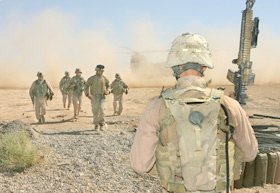
Marines and Navy corpsmen from 3rd Battalion, 5th Marine Regiment, clear the landing zone after rushing a wounded Marine to a CH-46 helicopter for medical evacuation at Observation Post Falcons Monday June 12, 2006. Cpl. Chad Pioske, a team leader, stands security.
Marines engage enemy in Habbaniyah
Story and photo by Cpl. Mark Sixbey
1st Marine Division
Marines and Navy corpsmen from 3rd Battalion, 5th Marine Regiment, clear the landing zone after rushing a wounded Marine to a CH-46 helicopter for medical evacuation at Observation Post Falcons Monday June 12, 2006. Cpl. Chad Pioske, a team leader, stands security.
CAMP HABBANIYAH, Iraq - Marines of 3rd Battalion, 5th Marine Regiment engaged insurgents in direct firefights twice in three days at Observation Post Bears along a main route through the city.
The battalion recently built new observation posts along the highway connecting Fallujah and Ramadi, an area near the Euphrates River with no distinct city lines or local government.
Pfc. Matthew Donnelly, an infantryman attached to the battalion, was standing post when the first attack broke out June 10.
“The next thing I know machine guns start opening up on the posts, including mine,” said the 19-year-old from Salem, Ore. “I got down and got my weapon to start shooting.”
Most of the Marines in the house were resting when the attack started, preparing for such an occasion. Bullet ricochets and rocket-propelled grenades broke their slumber.
“I was sitting down listening to my music when suddenly I hear rounds impacting and bouncing off the wall,” said Lance Cpl. Nicholas Garlich, an infantryman from Kansas City, Kan. “I put on my gear and ran to the post at the north and an RPG hit the window. I was inside the room by myself. I got a little wound on my arm.”
After a quick bandage was applied to his left shoulder, Garlich ran to the rooftop to join the rest of the Marines already returning fire with their M-16’s and one special surprise – a shoulder-launched multi-purpose assault weapon.
“The Marines fired a SMAW and the enemy went away,” Donnelly said. “They called in an air strike and the tanks helped out. They blew up the house they were shooting from.”
Everything was quiet on OP Bears until dusk two days later.
Donnelly was asleep downstairs when the enemy came back to the house with RPGs and a suicide vehicle-borne improvised explosive device. A blast quickly opened his eyes.
“I got up and ran for my flak,” he said. “They laid a heavy suppression while the VBIED snuck up on us.”
He got a step out of the room when the vehicle exploded and knocked him off his feet. The insurgent driver killed himself in the attack.
“I saw the door blow open and it looked like slow motion,” Garlich said. “The windows blasted out and everyone tried to get on their gear as fast as possible.”
The fighting lasted all of 10 minutes until the insurgents were driven away. Two Marines were injured and were rushed down the road to a nearby position for a helicopter medical evacuation. One Marine was still alert and able to stand, but both needed medical attention.
Navy Seaman Brandon Van Wagoner, a hospital corpsman for the battalion, was waiting and ready with a stretcher. He only had moments to treat the Marines before they were flown to Camp Taqaddum for follow-on treatment.
“As soon as we got him strapped in, the helicopter was landing,” said the 20-year-old from Fostoria, Mich. “It was the fastest air support I’ve ever seen.”
“He looked all right, but pretty shaken up,” added Navy Seaman Enoch Sitzo, a hospital corpsman for I Company. “We didn’t have time to do a really thorough assessment, but they took him to TQ really fast, so he’s in good hands.”
Within a span of minutes, additional air support finished off the insurgents’ position down the road with an earth-shaking explosion.
“We dropped a 500-pound bomb and leveled a building,” Donnelly said. “When I heard the missile going overhead, I opened my mouth, plugged my ears and felt the house shake. It was very loud.”
The battalion recently shifted its area of operation west into Habbaniyah after five months of relative peace near Fallujah and Amiriyah. Like many Marines, Garlich has mixed feelings about his first heavy combat experience.
“To tell you the truth we were hoping for a fight, but when rounds are coming downrange, the whole scenario changes,” he said. “The second one was definitely more nerve-racking than the first because a few people got hurt.”
Marines since returned to their companies, expecting a full recovery from their concussions.
“At the time we didn’t know how bad they were, so we were worried for them,” Garlich said. “It was one of those experiences you wish would never happen again, but in a way you do, because we kicked some ass.”









0 Comments:
Post a Comment
<< Home